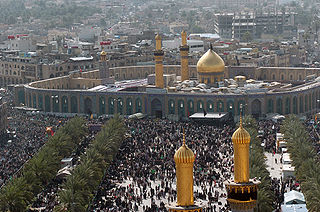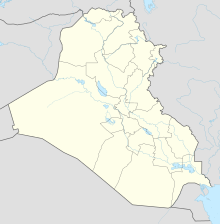
Karbala or Kerbala is a city in central Iraq, located about 100 km (62 mi) southwest of Baghdad, and a few miles east of Lake Milh, also known as Razzaza Lake. Karbala is the capital of Karbala Governorate, and has an estimated population of 700,000 people (2015).

Norfolk International Airport is seven miles (11 km) northeast of downtown Norfolk, an independent city in Virginia, United States. It is owned and operated by the Norfolk Airport Authority: a bureau under the municipal government. The airport serves the Hampton Roads metropolitan area of southeast Virginia as well as northeast North Carolina. Despite its name, the airport does not have any international destinations.

The Sanctuary of Imām 'Alī, also known as the Mosque of 'Alī, located in Najaf, Iraq, is a mosque which Shī'a Muslims believe contains the tomb of 'Alī ibn Abī Tālib. He was a cousin of the Islamic prophet Muhammad and later became his son-in-law. The Shī'as consider 'Alī as their first Imām, and the Sunnis regard him as the fourth Sunni Rashid Caliph. According to Shī'ite belief, buried next to 'Alī within this mosque are the remains of Adam and Nuh (Noah). Each year millions of pilgrims visit the Shrine and pay tribute to Imām 'Alī.

Ashura is an Islamic holiday that occurs on the tenth day of Muharram, the first month in the Islamic lunar calendar. For Muslims, Ashura marks the day in which the Islamic prophet Musa was saved by Allah when he parted the sea while leading the children of Israel to the land of Israel. Furthermore, for Muslims, it marks the day on which the Battle of Karbala took place, resulting in the martyrdom of Husayn ibn Ali, the grandson of the Islamic prophet Muhammad and a member of the Household of Muhammad.

Arbaʽein, Chehellom is a Shiite religious observance that occurs forty days after the Day of Ashura. It commemorates the martyrdom of Al-Husayn ibn Ali, the grandson of Muhammad, who was martyred on the 10th day of the month of Muharram. Al-Husayn ibn Ali and 71 of his companions were martyred by Ubayd Allah ibn Ziyad's army in the Battle of Karbala in 61 AH.

Martha's Vineyard Airport is a public airport located in the middle of the island of Martha's Vineyard, three miles (5 km) south of the central business district of Vineyard Haven, in Dukes County, Massachusetts, United States. This airport is owned by Dukes County and lies on the border between the towns of West Tisbury and Edgartown.

The Imam Husayn Shrine or the Place of Imam Husayn ibn Ali is the mosque and burial site of Husayn ibn Ali, the third Imam of Islam, in the city of Karbala, Iraq. It stands on the site of the Mausoleum of Husayn, who was a grandson of Muhammad, near the place where he was martyred during the Battle of Karbala in 680 CE The tomb of Husayn is one of the holiest places in Islam, outside of Mecca and Medina, and many make pilgrimages to the site. Every year, millions of pilgrims visit the city to observe Ashura, which marks the commemoration of Husayn's death. Every year for Arba'een rituals that occurs forty days after the Day of Ashura up to 45 million people go to the city of Karbala.

The airport apron, apron, flight line, ramp, or tarmac is the area of an airport where aircraft are parked, unloaded or loaded, refueled, boarded, or maintained. Although the use of the apron is covered by regulations, such as lighting on vehicles, it is typically more accessible to users than the runway or taxiway. However, the apron is not usually open to the general public and a permit may be required to gain access. By extension, the term apron is also used to identify the air traffic control position responsible for coordinating movement on this surface at busier airports.

The history of Islam in Iraq goes back almost 1,400 years to the lifetime of Muhammad. Iraq's Muslims follow two distinct traditions, Shia Islam (majority) and Sunni Islam (minority).
The 2007 Karbala bombings refer to a series of bombings in Karbala, Iraq in April 2007.

The Imam Hussein Mosque or Jame Sayyidna Husayn is a mosque and mausoleum of Husayn ibn Ali, originally built in 1154, and then later reconstructed in 1874. The mosque is located in Cairo, Egypt, near the Khan El-Khalili bazaar, near-by the famous Al Azhar Mosque, in an area known as Al-Hussain. It is considered to be one of the holiest Islamic sites in Egypt. Some Shia Muslims believe that Husayn's head is buried on the grounds of the mosque where a mausoleum is located today and considered to be what is left of the Fatimid architecture in the building.

The Mourning of Muharram is a set of commemoration rituals observed primarily by Shia and Sufi Muslims. The commemoration falls in Muharram, the first month of the Islamic calendar. Many of the events associated with the ritual take place in congregation halls known as Hussainia.
The Battle of Karbala was a battle which was fought during the 1991 uprisings in Iraq which followed the Gulf War. The battle started after demoralized troops throughout Iraq began to rebel against Saddam Hussein. From 5 to 19 March 1991, the city of Karbala became a chaotic battlefield as the result of bitter fighting between the insurgents and the Iraqi Republican Guard. After the failure of the uprising, citizens were killed in large numbers. Parts of the city were nearly leveled.

The Al-Abbas Shrine is the mausoleum of Abbas ibn Ali and a mosque, located near the Imam Husayn Mosque in Karbala, Iraq. Abbas was son of Ali ibn Abi Talib and the half-brother of Imam Hasan and Imam Husayn. He was Husayn's flag-bearer in the Battle of Karbala and chief of his caravans. The shrine is especially revered by the Shia who visit it every year, in the month of Muharram rather than various other times of the year.

Shia Muslims consider sites associated with Muhammad, his family members, Shia Imams and their family members to be holy. After the four holy cities of Islam, Najaf, Karbala and Qom are the most revered by Shias.
Shia Islam in Iraq has a history going back to the times of Ali ibn Abi Talib, the first imam of Shia Islam and fourth caliph of Sunni Islam who moved the capital of the early caliphate from Medina to Kufa two decades after the death of Muhammad. Today, Shia Muslims make up the majority of the Iraqi population.

Hussein Who Said No is a historical film directed by Ahmad Reza Darvish. The story narrates Battle of Karbala on Day of Ashura and tells the uprising of Hussein ibn Ali in 680 CE against Yazid ibn Muawiyah ibn Abu Sufyan. The story of the movie is centered around Bukair ibn Al-Hurr ibn Yazid Al-Tamimi Ar-Riyahi.

Tourism in Iraq refers to tourism in the Western Asian country Iraq. Iraq was one of the main destinations for many years, however it changed dramatically due to conflicts. The tourism in Iraq has faced many challenges, however, in recent years there has been improvements. The capital city Baghdad is the second largest city in the Arab world and the 4th largest in the Middle East. Iraq has several World Heritage Sites, dating back to ancient Mesopotamia, most notably Babylon Iraq. Iraq is considered to be a potential location for ecotourism. Erbil was chosen as "Arab Tourism Capital" in 2014 by the Arab Tourism Committee.
Karbala International Airport is an airport under development in Karbala Governorate, Iraq. It is located between the cities of Najaf and Karbala, about 20 mi (32 km) to the southeast of Karbala. It was expected to be Iraq's largest airport upon completion, and to receive an inaugural flight in July 2018, but has been affected by corruption.















